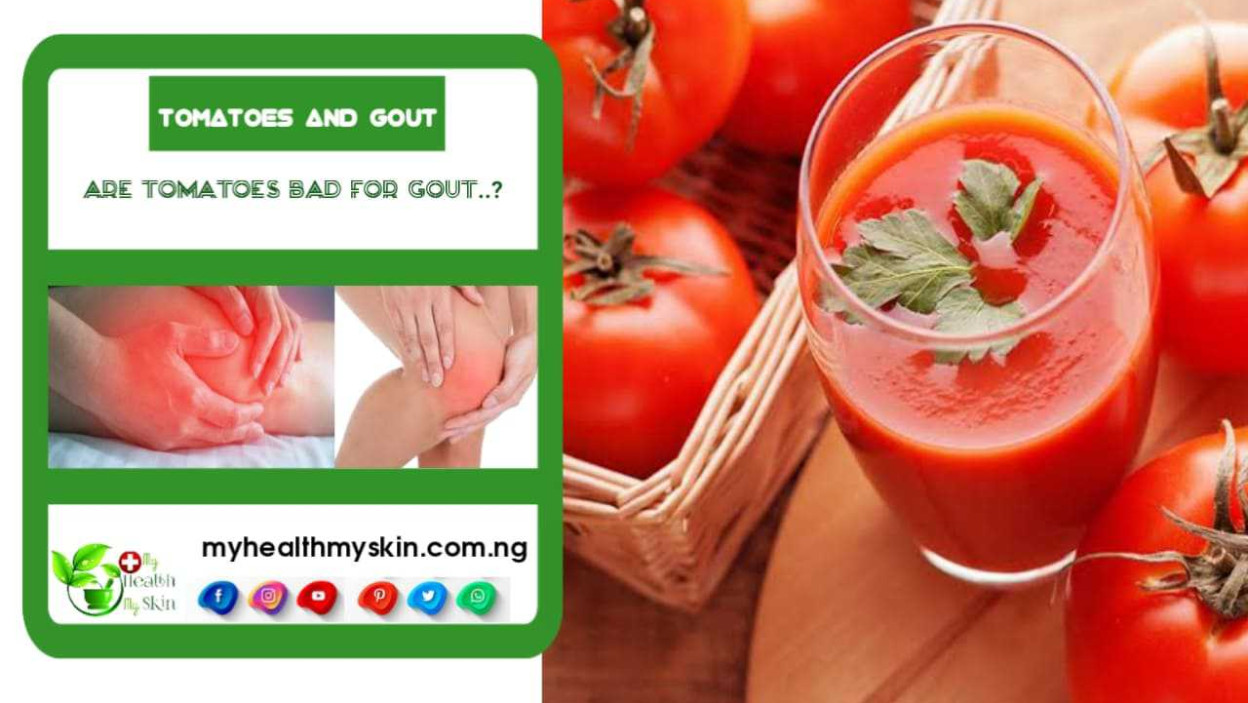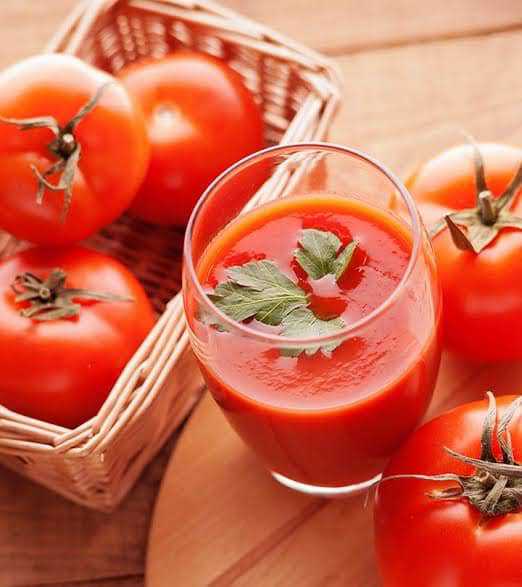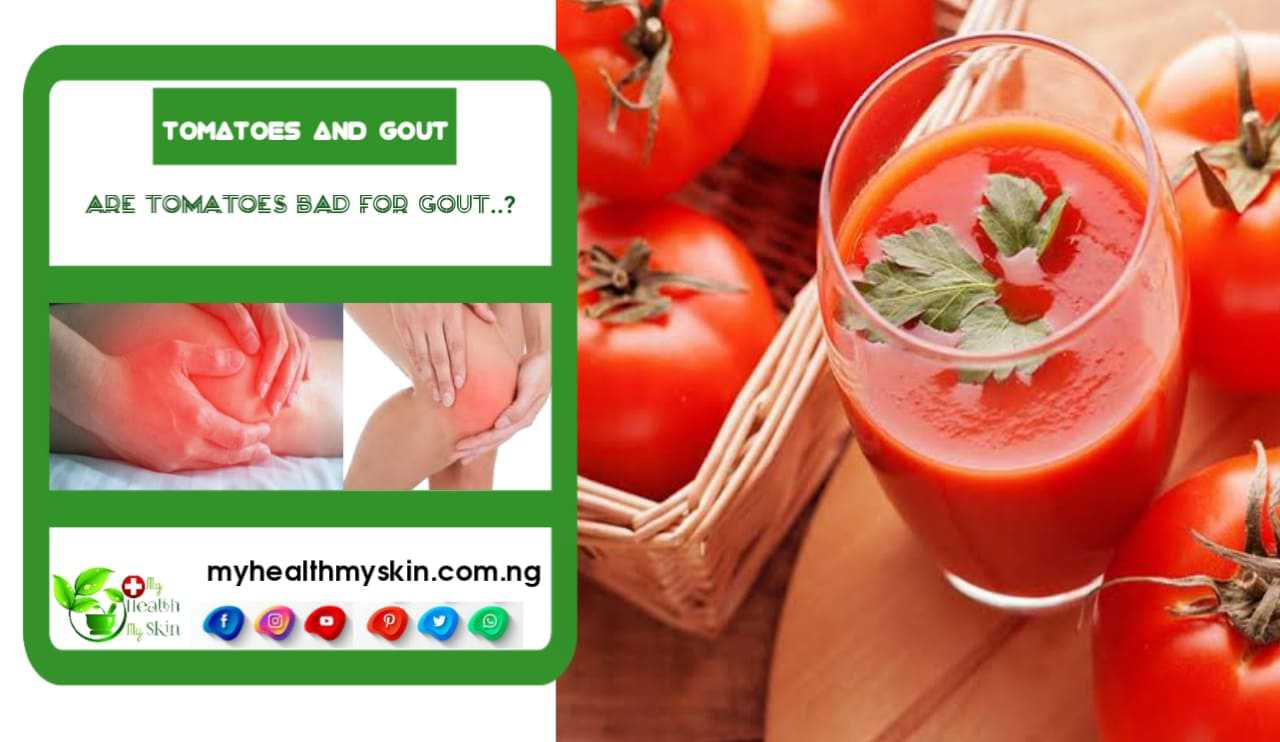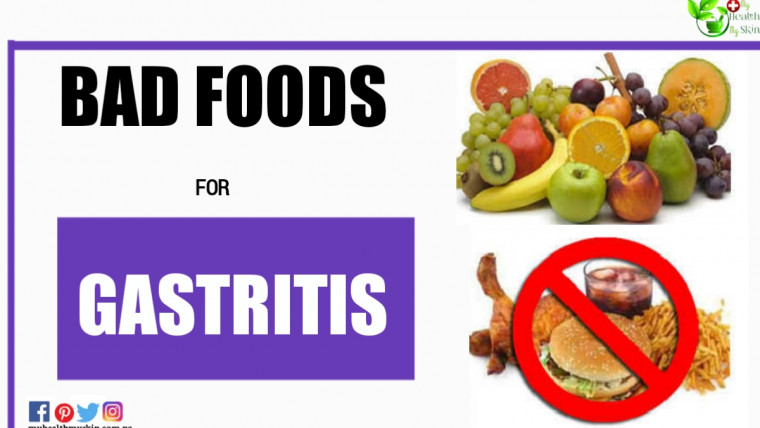Are tomatoes bad for gout? Popular belief says that tomatoes are bad for gout, but is that true or is it a hoax? There are many myths about food that lead us to blindly believe things, such as that water makes us fat or other urban legends. For this reason, at MyhealthMyskin, we want to clear up your doubts and explain in detail the answer to whether it is bad to eat tomatoes for gout.
Do cut off all distractions, pay a close attention and take your time to educate yourself to know if tomatoes are bad for gout.
As is known, Gout is one of the most brutal and painful forms of arthritis. Resulting from a surplus of uric acid in the blood, this disease generally affects the joint of the big toe and causes serious inflammation.
In order to avoid the increase in uric acid, following a specific diet is advised. What foods high in purines should be avoided to lower uric acid levels in the body? Should we stop eating tomatoes to avoid excess uric acid?
Also Read: 11 Benefits Of Pineapple Sexually (Men & Women)
[lwptoc]
What is Gout?

Gout is a rheumatic disease caused by the deposition of uric acid salts, first in the joints, then in the kidneys. Gout develops against the background of a violation of purine metabolism. As a result, with the development of an inflammatory process, uric acid crystals and their derivatives form focal accumulations in tissues in the form of foci.
Why Does Gout Occur?
Gout is an arthritis-related condition that can be very painful. The body breaks down the chemical purine, found in some foods and in your body, to create uric acid. A high level of uric acid in the blood can cause crystals to form around the joints, which irritates the area and makes it painful.
Reducing the intake of foods high in purines may help some people manage flare-ups, even though diet has little effect on overall purine and uric acid levels in the body.
What Is A Gout Attack?
Gout is one of the forms of arthritis. It usually manifests as an attack of extreme pain accompanied by swelling in the big toe.
Sometimes, however, certain joints such as the knee, hip or elbow are swollen due to a gout attack.
It is an acute inflammatory disease that appears when the level of uric acid present in the blood is higher than normal. This phenomenon is commonly called hyperuricemia.
As a reminder, uric acid is a kind of waste produced by the body and eliminated by the kidneys. If there is an increase in uric acid and the kidneys fail to eliminate this excess, crystals form at the level of the joint, thus causing a painful attack of gout.
There are many risk factors for hyperuricemia:
- Hypertension;
- heredity;
- Kidney failure;
- Diabetes;
- Obesity;
- Stress (physical or emotional);
- A diet high in purine;
- A high level of glycerides or cholesterol;
- Excessive consumption of alcoholic beverages;
- Etc.
Note that gout is much more common in men than in women. In principle, this disease appears in men from the age of fifty. It occurs after menopause in women. On the other hand, it is quite rare in young individuals, but often more serious in cases occurring before the age of 30.
Also Read: Do Groundnuts (Peanuts) Really Cause Pimples? Check All Details Here!
Do Tomatoes Trigger Flare-ups Of Gout?
from the Department of Biochemistry at the University of Otago, New Zealand, researchers have found that many people with gout believe tomatoes are among the foods that cause gout.
2,051 New Zealanders with clinically confirmed gout were interviewed by the researchers. 71% of respondents acknowledged having one or more food triggers. In 20% of cases, tomatoes were cited as the trigger.
The authors collected and analyzed data from 12,720 male and female participants in three ongoing US health studies after concluding that tomatoes are a commonly cited trigger food.
This information demonstrated a link between tomato consumption and higher blood levels of uric acid, which is the main underlying cause of gout.
The researchers said their study was not intended to prove that tomatoes cause gout attacks. The results, however, indicate that this food can alter uric acid levels to a degree comparable to other commonly accepted gout-triggering foods.
The researcher went on to say that the most important thing people with gout can do to prevent attacks is to take a medication that lowers uric acid levels, such as Allopurinol.
How Do You Know If Tomatoes Are Triggering Your Symptoms?
To find out if tomatoes are a trigger for you, try eliminating all tomato products for a few weeks and see if your symptoms improve. Keeping a detailed log of what you eat over time can help you figure out which foods are triggering you.
Keep a food diary and fill it in daily with the information below:
- Everything you eat at every meal and snack, including drinks and condiments.
- How much water do you consume?
- How you slept the night before.
- Your state of mind throughout the day.
- Your body’s pain areas and levels throughout the day
- Your level of energy or fatigue during the day.
- What type of physical activity and exercise do you do?
- All medications and supplements you use.
Look for trends that could be related to your diet or something else. Showing this record to your doctor can also help uncover underlying triggers.
Read Also: Longevity Spinach: 13 Potential Health Benefits, Uses And How To Grow
Other Foods You May Need to Avoid if You Have Gout
Although the research was not aimed at verifying the effects of tomato in patients with gout, it does suggest that this food can alter uric acid levels as occurs with other foods that are considered risky, such as “oats, spinach, asparagus, mushrooms, red meat, alcohol and sugary drinks.
According to research, a survey was conducted involving 2,051 gout patients from New Zealand, a country where four to five percent of men suffer from the disease. A review of health studies from the United States was then conducted, and in total data from more than 12,000 men and women were analyzed to determine the health effects of tomatoes.
Avoiding tomatoes may be beneficial for people who have had a gout attack after eating them, but with specific treatment it would not be necessary to stop eating them and that further studies are needed to determine whether to add the tomato to the list of triggers for gout.
When Should You See A Doctor?
Gout attacks are unpredictable and usually only affect one joint at a time, such as the big toe. Other joints commonly affected are the other toes, the ankle and the knee. Symptoms of a flare-up are usually obvious and include:
- The pain is excruciating.
- Sensitivity and warmth.
- The range of motion is limited.
- Inflammation
- Swelling
- Redness
If you have any of the above symptoms, see a doctor as soon as possible. Gout symptoms that are left untreated can lead to worsening pain, more frequent episodes, or permanent joint damage.
Conclusion
Although tomatoes are very nutritious and suitable for most gout patients, they should be eaten as part of an overall balanced diet. Do not go and eat tomatoes at any time of the day or night because I have written about their many health benefits.
Finally, a word of warning: try to read the labels of food products containing tomatoes and check the amount of sodium they contain. Also check the sugar content, as salt and sugar can have devastating effects on your health and can also increase the risk of gout!
FAQ’s
What Is Uric Acid?
What To Do If We Have It High?
High Uric Acid: Symptoms And Consequences
Existing in minute quantities in the body, uric acid is more precisely in the blood. When a high concentration is reached, hyperuricemia occurs. Severe pain then occurs in the joint during the night or in the early morning. The pain gets progressively worse and quickly becomes unbearable, especially when moving or manipulating the joint. This becomes swollen and warm, and the skin over it turns red or purplish.
Here are the usual signs that appear when the level of uric acid is high:
- Chills;
- Fever up to 38.9°C;
- Tachycardia;
- Tiredness;
- Difficulty urinating;
- A kidney stone;
- The presence of “Tophi” taking the form of hard bumps in the joints;
- Pain in the knees;
- Intense pain in the big toe.
Moreover, when the uric acid level exceeds 80 mg/l, the risk of developing gout attacks becomes significant. In the event that the increase in uric acid persists for several years, the disease becomes chronic.
Uric acid and food: what relationship?
As part of a gout diet, promoting a low purine diet is recommended. This type of program makes it possible, among other things, to prevent and alleviate symptoms related to gout.
What foods break down purines?
There are a number of foods full of purines that cause uric acid to rise in the blood.
- Seafood: mussels, oysters, crabs, clams, shrimps. They are among the foods to avoid for people with high uric acid levels, whether canned, fresh or smoked.
- Red meat: Pork and beef are high in purines. Consumption of their meat thus contributes to the increase of uric acid in the body. Therefore, minced meat, meat extract, viscera… All this should be strongly avoided in the diet of a person with gout.
- Vegetables: asparagus, mushrooms, cauliflower, leeks, tomatoes, radishes. Some vegetables should be eaten in moderation to avoid excess uric acid.
- Sugary and alcoholic beverages: beer should be avoided for individuals with high uric acid levels. Thus, many researchers advise against beer for gout sufferers. This is also the case for soft drinks and commercial fruit juices.
If you want to read more articles similar to are tomatoes bad for gout? everything you need to know, we recommend you visit our Diet & Nutrition category. Share on your social networks and stay tuned for upcoming articles.









